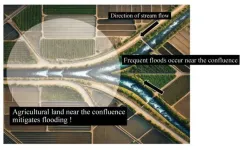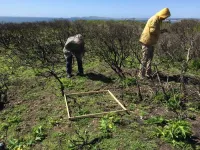(Press-News.org) Parents who face the heartbreaking loss of their child should get a specific keyworker to support them through bereavement, wherever they are in the country, according to a set of recommendations informed by new research.
In an academic paper published in Archives of Disease in Childhood today, bereaved parents and academic experts from the University of Birmingham, University of Bristol and Birmingham Community Healthcare NHS Foundation Trust have outlined their recommendations for support that all bereaved parents should receive as part of the Child Death Review (CDR) process. The aim of Child Death Review is to learn from deaths and improve quality of care for children and families.
The Child Death Review toolkit has been endorsed by the national charity Child Bereavement UK and shared with the Royal College of Paediatrics and Child Health and includes recommendations for parents having a named bereavement support key worker contact them within 24 to 48 hours after their child has died.
The recommendations follow a study funded by the National Institute for Health and Care Research involving interviews with 21 multi-disciplinary healthcare professionals and 23 bereaved parents of children who died in 2021-22, during hospital admission, or under palliative care. The study outlined key experiences that parents went through during the CDR process including how they were told about reviews, professionals not understanding about the parents’ role, and not having a specific key worker to support them during the process. Bereaved parents, healthcare professionals and bereavement support charities worked together to design the toolkit to enable better support for families and improved communication about Child Death Review.
The toolkit also includes key suggestions to help clinicians receive appropriate training for supporting bereaved parents and provides a structured format for parents to ask questions, give feedback to professionals and learn the outcomes of Child Death Reviews:
Dr Joanna Garstang, Clinical Associate Professor of Child Protection at the University of Birmingham, Consultant Community Paediatrician, Birmingham Community Healthcare NHS Trust and principal investigator of the study said:
“As a parent, losing a child is probably the most traumatic experience and causes unimaginable pain. Parents should be met with the greatest care and compassion and be able to contribute to Child Death Reviews, where professionals seek to learn from and understand what factors led to that child’s death.
“Sadly, many families around the country face a postcode lottery of uneven models of personal support and at times a lack of communication about the nature of a review which can lead to feelings of guilt, frustration and abandonment.
“Our study and work on the Child Death Review toolkit sought to learn from the experiences of parents and healthcare professionals that have gone through this process. Our findings show that many families have not had a level of care and support to understand what to do in a CDR and their role and voice in the process. Our toolkit provides practical and systematic recommendations for healthcare professionals, assuring parents that those providing them support are trained and equipped in the aftermath of their darkest moments.”
‘Forever missing a piece’ – parent perspective on losing their child
Hannah Johnston and her husband Keith faced their “world falling apart” after tragically losing their youngest son, William who died after being taken ill suddenly in 2021. William, who was 21 months and had never shown any signs of serious illness, had a seizure and went into cardiac arrest and was rushed urgently to a local hospital in an ambulance.
Hannah recalls: “It was like a scene from a medical drama. There were 20 people in the room. Lots of people introducing themselves to us. Keith and I were just stood there like a deer in in headlights, not being able to quite process what was happening here. And they said that we would need to be moved to a paediatric intensive care unit.”
William was then taken with his mum to a Paediatric Intensive Care Unit and placed on life support with 24-hour care. Sadly, he died four days after first being admitted.
“We left the hospital that day and at the time the only aftercare we received was being handed a booklet called When a Child dies. I felt like I had taken a bullet to the chest. To be given this book and being put into a taxi, with nothing. No number to call, no support. How do you tell a five and a six-year-old that their brother has died? What language do you use? How much about death do they understand?”
For Hannah and her family, the offer of support came slowly and their experience of the Child Death Review didn’t provide them with any answers or sense of support:
“We waited seven weeks for a first face-to-face meeting, but even after that there were still a lot of unanswered questions. The Review itself took place six months after William had died but before genetic testing had come back so the whole picture wasn't there at that point. A lot of key agencies didn't attend which was really disappointing and disheartening. Your child is dead. They don't have a voice. They can't leave their mark on the world anymore, and it's almost as if to the people who cared for him, it didn't matter anymore.”
Hannah recalls that she was offered support from a local hospice and the charity SUDC that provided bereavement care.
Hannah took part in the study as she recognised that advocacy and sharing her son’s story was part of her own family’s grief journey and to do it in memory of William.
“I knew a lot of families wouldn't be able to do what I'm doing. Sit and share their story, advocate for other families. I really wanted to do something positive and hopefully make a difference in his name going forward.
“I know that there's pockets all over the country where some families receive exceptional care and other families don't have anything, and I just want for there to be consistency across the board for any family who goes through the worst, most unimaginable pain.”
Child Bereavement UK, a charity which supports children and young people when someone important to them has died or is not expected to live, and parents and the wider family when a baby or child of any age dies or is dying, has worked alongside Dr. Joanna Garstang and the National Child Mortality Database to develop training for professionals involved in Child Death Reviews and in how to best use the Toolkit with families affected by the death of a child.
Maninder Hayre, Director of Services and Partnerships at Child Bereavement UK said:
“When a baby or child dies suddenly or unexpectedly, lives are shattered. Families we support at Child Bereavement UK tell is that their world is turned upside down. There are often so many agencies, procedures and people involved such as the hospital, doctors, nurses, coroners, and sometimes even the police, that it can be overwhelming for parents and carers to take everything in. It may be some time before they face a post-mortem and a coroner’s report and they ultimately put their grief on hold, waiting for answers; in some cases they may never know why their child died.
“It is vital that parents and carers have the opportunity to process what is happening and have a voice. Child Bereavement UK welcomes the Child Death Review Toolkit for clinicians and we fully endorse the recommendations of this study to ensure that bereaved parents have a key worker to help guide and support them through what is undoubtedly the darkest time in their life.”
Nikki Speed, CEO and Co-Founder of SUDC UK said:
"Every family who loses their child deserve a compassionate, trained key worker. SUDC UK were privileged to be involved in this pivotal project that has created an evidence base for change."
Paul Dimitri, Vice-President for Research at the Royal College of Paediatrics and Child Health said:
“The loss of a child is an unparalleled tragedy, bringing immense sorrow to parents, carers, and families. The Child Death Toolkit from the Birmingham team is a commendable resource, offering vital support to clinicians as they guide grieving families through this immensely difficult time.”
END
Supporting parents through “unimaginable pain” of losing child – new toolkit developed for clinicians involved in Child Death Review
New paper outlines recommendations to end “postcode lottery” of good care in UK for bereaved parents
2024-12-08
ELSE PRESS RELEASES FROM THIS DATE:
Could online technology be a clue as to why boys in Norway are outperforming girls in learning English as a second language?
2024-12-08
Bucking conventionality, boys in Norway are making early gains in reading English as a second language and even outperforming girls at age 10 and 13 – a new a study of more than one million students suggests.
Publishing their findings in the peer-reviewed journal Assessment in Education: Principles, Policy & Practice, experts from the University of Oslo propose the perhaps unexpected results might be explained by online gaming and experiences with other digital technologies such as YouTube – with English being the language of the internet.
“Our ...
A healthy diet helps the weighty battle with chronic pain
2024-12-08
Chronic pain is an acute and debilitating condition that affects millions of people worldwide. And while pain interventions are available, many people struggle without treatment at all.
Now new research from the University of South Australia shows that adopting a healthy diet can reduce the severity of chronic pain, presenting an easy and accessible way for sufferers to better manage their condition.
Exploring associations between body fat, diet, and pain, researchers found that a greater consumption of foods within the Australian Dietary Guidelines was directly associated with lower levels of body ...
ASH 2024: Antibody shows encouraging results for treating high-risk follicular lymphoma and marginal zone lymphoma
2024-12-08
MIAMI, FLORIDA (STRICTLY EMBARGOED UNTIL DEC. 8, 2024, AT 12 NOON EST) – Two clinical trials testing the antibody loncastuximab tesirine (Zynlonta) showed encouraging results in patients with high-risk forms of two blood cancers – follicular lymphoma and marginal zone lymphoma. The findings, led by physician-scientists at Sylvester Comprehensive Cancer Center, part of the University of Miami Miller School of Medicine, will be presented at the American Society of Hematology’s 2024 meeting in San Diego.
One study, a phase 2 clinical trial led by Juan Alderuccio, M.D., ...
Observation of new electric field signals strong potential for assorted devices: new research at City University of Hong Kong
2024-12-08
HONG KONG (8 December 2024)—A new vortex electric field with the potential to enhance future electronic, magnetic and optical devices has been observed by researchers from City University of Hong Kong (CityUHK) and local partners.
The research, published in Science, is highly valuable as it can upgrade the operation of many devices, including strengthening memory stability and computing speed. With further research, the discovery of the vortex electric field can even later impact the fields of quantum computing, spintronics, and nanotechnology.
“Previously, generating a vortex electric field required expensive thin film deposition techniques and complex procedures. However, our ...
A sickle cell first: Base editing, a new form of gene therapy, leaves patient feeling ‘more than fine’
2024-12-07
Though he doesn’t remember it, Branden Baptiste had his first sickle cell crisis at age 2. Through elementary school, he was in and out of the hospital with pain episodes, not knowing why. As he got older, he learned he had sickle cell disease: His red blood cells were forming sickle shapes and getting stuck in his blood stream, preventing oxygen from reaching his tissues.
“From age 12, things skyrocketed,” says Branden, now 20. “I was in the hospital every other month with crises.” He estimates he missed 60 days of school every year.
In sixth grade, Branden had to have his left hip replaced ...
Keto diet metabolite may power up CAR T cells to kill cancer
2024-12-07
SAN DIEGO – A simple dietary supplement may provide a new approach to boost CAR T cell function, according to a study from researchers in the Perelman School of Medicine at the University of Pennsylvania and Penn Medicine’s Abramson Cancer Center. While the approach needs to be assessed in clinical trials, the early research, shared in a press briefing today at the 66th American Society of Hematology (ASH) Annual Meeting and Exposition (Abstract 4), hints at a potentially cost-effective strategy to improve CAR T cell function and cancer-fighting abilities.
CAR T cell therapy is a ...
New study reveals a fiber diet may delay a type of blood cancer
2024-12-07
Today researchers at Memorial Sloan Kettering Cancer Center (MSK) reported results from the first ever clinical trial to show that a high fiber plant based dietary intervention may delay progression to multiple myeloma, a type of rare, incurable blood cancer affecting the bone marrow. The study enrolled 20 participants with a precancerous blood disorder and an elevated body mass index (BMI) at risk for developing multiple myeloma. They received 12 weeks of high fiber plant-based meals and 24 weeks of coaching. Two participants with progressing disease prior to study showed a significant improvement of their disease progression trajectory. Additionally, at one year ...
Global clinical trial shows improved survival rates for common childhood leukemia
2024-12-07
Just days before his fourth birthday, Santiago was diagnosed with B-cell acute lymphoblastic leukemia (B-ALL), the most common cancer in children.
He began chemotherapy the next day, and the outlook was promising – disease-free survival rates for B-ALL are among the highest for paediatric cancers, at 80 to 85 per cent. However, limited progress has been made over the last 15 years, and relapsed B-ALL remains a leading cause of cancer death among children.
Seeking to explore all options, Santiago’s parents enrolled him in a Children’s Oncology Group clinical trial led by scientists ...
Agricultural land near where rivers meet can mitigate floods
2024-12-07
Tokyo, Japan – Researchers from Tokyo Metropolitan University showed that agricultural land preserved around river confluences can help mitigate floods. They make a case for Eco-DRR, an approach that uses existing environmental resources to improve resilience against flooding. Statistical analysis showed that municipalities with agricultural land in areas with high water storage potential suffered fewer floods, with stronger correlation when agricultural land was situated near river confluences. The team hope their findings inform effective land usage.
Climate change has brought ...
Hybrid theory offers new way to model disturbed complex systems
2024-12-06
In fields ranging from immunology and ecology to economics and thermodynamics, multi-scale complex systems are ubiquitous. They are also notoriously difficult to model. Conventional approaches take either a bottom-up or top-down approach. But in disturbed systems, such as a post-fire forest ecosystem or a society in a pandemic, these unidirectional models can’t capture the interactions between the small-scale behaviors and the system-level properties. SFI External Professor John Harte (UC Berkeley) and his collaborators have worked to resolve this challenge by building a hybrid method that links bottom-up behaviors and top-down causation in a single theory.
Harte et ...
LAST 30 PRESS RELEASES:
New knowledge on heritability paves the way for better treatment of people with chronic inflammatory bowel disease
Under the Lens: Microbiologists Nicola Holden and Gil Domingue weigh in on the raw milk debate
Science reveals why you can’t resist a snack – even when you’re full
Kidney cancer study finds belzutifan plus pembrolizumab post-surgery helps patients at high risk for relapse stay cancer-free longer
Alkali cation effects in electrochemical carbon dioxide reduction
Test platforms for charging wireless cars now fit on a bench
$3 million NIH grant funds national study of Medicare Advantage’s benefit expansion into social supports
Amplified Sciences achieves CAP accreditation for cutting-edge diagnostic lab
Fred Hutch announces 12 recipients of the annual Harold M. Weintraub Graduate Student Award
Native forest litter helps rebuild soil life in post-mining landscapes
Mountain soils in arid regions may emit more greenhouse gas as climate shifts, new study finds
Pairing biochar with other soil amendments could unlock stronger gains in soil health
Why do we get a skip in our step when we’re happy? Thank dopamine
UC Irvine scientists uncover cellular mechanism behind muscle repair
Platform to map living brain noninvasively takes next big step
Stress-testing the Cascadia Subduction Zone reveals variability that could impact how earthquakes spread
We may be underestimating the true carbon cost of northern wildfires
Blood test predicts which bladder cancer patients may safely skip surgery
Kennesaw State's Vijay Anand honored as National Academy of Inventors Senior Member
Recovery from whaling reveals the role of age in Humpback reproduction
Can the canny tick help prevent disease like MS and cancer?
Newcomer children show lower rates of emergency department use for non‑urgent conditions, study finds
Cognitive and neuropsychiatric function in former American football players
From trash to climate tech: rubber gloves find new life as carbon capturers materials
A step towards needed treatments for hantaviruses in new molecular map
Boys are more motivated, while girls are more compassionate?
Study identifies opposing roles for IL6 and IL6R in long-term mortality
AI accurately spots medical disorder from privacy-conscious hand images
Transient Pauli blocking for broadband ultrafast optical switching
Political polarization can spur CO2 emissions, stymie climate action
[Press-News.org] Supporting parents through “unimaginable pain” of losing child – new toolkit developed for clinicians involved in Child Death ReviewNew paper outlines recommendations to end “postcode lottery” of good care in UK for bereaved parents


